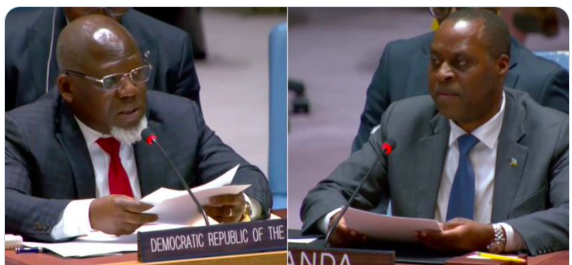In a United Nations Security Council meeting held in New York, USA, on Wednesday, a noticeable strain was evident between the representatives of Rwanda and the Democratic Republic of Congo (DR Congo). The session, aimed at discussing the ongoing conflict in DR Congo, witnessed the exchange of serious allegations between the two nations, highlighting the complexities of regional politics and the international community’s efforts to achieve peace.
The Security Council, composed of 15 member countries, including five permanent members with significant influence, holds the authority to enforce peace measures, impose sanctions, or authorize the use of force to maintain or restore international peace and security. This body represents the highest level of international conflict resolution and decision-making.
During the meeting, Zenon Mukongo, representing DR Congo, accused Rwanda of exacerbating the conflict within his country by supporting the M23 rebel group. He called for the Security Council to impose sanctions on Rwanda for its alleged involvement in the hostilities, highlighting the use of advanced weaponry by Rwandan forces in Congo. Mukongo advocated for a peaceful resolution through diplomatic means but insisted that Rwandan forces and M23 rebels must withdraw from DR Congo without conditions, urging the Council to demand the disarmament of M23.
Mukongo also praised the deployment of Southern African Development Community (SADC) troops in Congo, referring to it as “African solutions to African problems,” and sought substantial support for these forces from the Security Council.
Ernest Rwamucyo, representing Rwanda, criticized the effectiveness of the United Nations Organization Stabilization Mission in the Democratic Republic of the Congo (MONUSCO), which has spent $24 billion without significant progress, as the number of armed groups in the region has risen to 250. He raised concerns about hate speech and the potential for genocide against Congolese Tutsis, stressing the international community’s obligation to prevent such atrocities. Rwamucyo highlighted the plight of refugees fleeing to neighboring countries, including Rwanda, and condemned any indifference to the rights of Congolese Tutsis and Kinyarwanda speakers.
Rwamucyo accused the Congolese armed forces (FARDC) of collaborating with the FDLR, a group opposed to the Rwandan government, and called for the disarmament and repatriation of FDLR combatants.
In a subsequent response, Mukongo questioned Rwanda’s justification for its presence in Congo, suggesting that Rwanda’s concerns for the Congolese Tutsis were misplaced and that the issue of FDLR is a diversionary tactic by Rwanda.
Other countries’ representatives emphasized the need for a diplomatic solution to the conflict in Congo, highlighting the importance of dialogue and regional efforts led by Angola’s President João Lourenço to mediate between Rwanda and DR Congo. France condemned the M23 attacks and Rwanda’s alleged support for the rebel group, while China and Russia expressed concerns about the escalating situation and called for a cessation of hostilities by M23.
The United States urged immediate high-level discussions with Rwanda regarding its alleged support for M23 and proposed a reassessment of Rwanda’s role in peacekeeping missions.
The Security Council meeting concluded without a resolution on the conflict in eastern DR Congo, reflecting the challenges of international diplomacy and the search for sustainable peace in the region.
































































